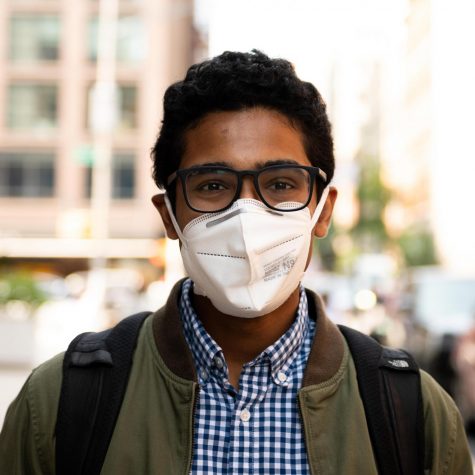It was a surreal experience to see my TikTok feed filled with moldy and bizarre excuses for meals from my own university. From watermelon chicken salad to a single piece of bread, it’s apparent that Chartwells, NYU’s dining provider, failed to provide quarantining students with adequate meals. Many students in quarantine weren’t provided food for an entire day, and those that did found themselves with inadequate meals that often went against their dietary restrictions.
NYU provided quarantining students with $30 per day on Grubhub so they could order adequate meals after the issues with meal delivery went public. This new program certainly helped, but it does very little to prevent incidents like this from taking place in the future. Moreover, the fact that some students had to starve while quarantining due to Chartwells’ incompetence is inexcusable. This is just the latest in a long line of controversies and embarrassments resulting from the incompetence of Chartwells, and it’s time for our university to find a new dining provider.
Last year, Palladium received a failing grade from the Department of Health and Mental Hygiene. Conditions in the kitchen had deteriorated to the point that filth flies were present. Palladium’s dining score has improved, but Chartwells has also been involved in numerous health scandals — in 2013, beef products distributed by the company were found to contain horse meat; in 2014, students at a Connecticut high school launched a boycott after finding mold, human hair and undercooked meat in the lunches provided by Chartwells. These past sanitary issues show that the provider fails to put student health first. NYU is jeopardizing the student body’s physical health as well their mental health in the middle of a pandemic by remaining with a dining provider that fails to carry out sanitary dining practices and to provide students with acceptable meals.
Chartwells’ issues extend beyond food and health. Compass Group, the parent company of Chartwells, has relationships with private prisons in Michigan and Florida. The food that a Compass subsidiary provided to several Ontario facilities was contaminated with listeria, causing an outbreak of listeriosis. Given that Chartwells has a history of providing clients with food that continuously puts their health at risk, it is troubling that NYU is willing to support a business that is directly responsible for substandard conditions in prisons and plays a part in incarceration. NYU cannot claim to be a diverse and inclusive institution while supporting systems of mass incarceration that disproportionately affect people of color.
It’s also troubling to consider how Chartwells came to be NYU’s dining provider in the first place. In 2019, NYU responded to months of student protests over previous dining provider Aramark’s ties to prisons, by cutting ties with the company before their contract ended in 2023. But rather than addressing the issue of employing a company that has connections to prisons, NYU simply replaced Aramark with yet another provider playing a part in mass incarceration. What we need is not just an alternative to Chartwells, but an alternative that does not directly go against NYU’s claims of inclusion and diversity by supporting widespread imprisonment. NYU can — and should — do better than any organization with ties to incarceration.
Unfortunately, many dining providers — including Sodexo, Chartwells, Aramark, and AVI Foodsystems — provide food to prisons, so it seems difficult for NYU to find a dining provider that isn’t involved with mass incarceration.
However, NYU could begin self-providing. The number one rated campus dining program belongs to UMass Amherst — a campus that self-provides by feeding students meals made with farm-fresh ingredients. While NYU does not have the ability to grow enough food to feed the community due to its urban location, several other colleges — including Ithaca College and the University of California, Berkeley — have also successfully switched to self-provided dining services by partnering with local vendors over large corporations.
NYU has a responsibility to provide the community with adequate food, but also to make good on their commitment to diversity and inclusion. Keeping a contract with Chartwells is directly contradictory to both of these goals. Now, more than ever, it is time for NYU to break away from dining providers marked by controversy and follow a more equitable path by self-providing dining services.
Opinions expressed on the editorial pages are not necessarily those of WSN, and our publication of opinions is not an endorsement of them.
Email Kevin Kurian at [email protected].

























































































































































James • Sep 7, 2020 at 12:00 am
While there are enough comments to highlight Kevin’s shoddy research, he is still missing a big mark. The cost to students for this miserable food experience is obscene. To pay up to $20,000 for crappy dorms and even more crappy food is what should be highlighted. Colleges with smaller endowments, lesser tuition have better dorms and food than NYU. NYU is a joke in many areas this being one of them.
Mary Beth • Sep 3, 2020 at 1:50 pm
wrong facts, Compass Group does not provide services in correctional facilities in the US, neither does SDX, only Aramark.
greg • Sep 3, 2020 at 8:38 am
sodexo doesn’t operate in any prisons in the united states, unlike compass and aramark. their leadership doesn’t believe in the death penalty and won’t work in prisons in countries that do believe in it.
Dj Mack • Sep 2, 2020 at 11:17 pm
Healthcare Services Group
Is viable option to look into for dining and environmental services. No known mass incarceration ties.
Nunya • Sep 2, 2020 at 11:12 am
Since prisons provide 3 hots and a cot to there inmates someone has to feed them or Heres an idea let the prisons self provide. It will pass there time while they sit around doing nothing.
Avery • Sep 2, 2020 at 9:39 am
One important aspect of NYU’s relationship with contractors like Chartwells is the relative lack of labor accountability to Chartwells employees. Many dining workers under Chartwells are not unionized and are therefore vulnerable in ways that NYU employees generally are not. We saw this last year at the law school when a dining employee was suspended and then terminated due to a dispute with a racist supervisor. (She was eventually rehired at a different facility after significant pressure from students.)
Whenever you see NYU passing the buck on mismanagement that hurts its students, think about what must be going on behind the scenes with NYU workers, who are far less valued and less able to attract headlines.
Jace • Sep 2, 2020 at 4:27 am
Wow, what a fool.
Companies like Chartwells, Sodexo, and Aramark can only hire people that are willing to live in the area and work there. Do you think that they dumped out and fired the entire labor pool when they took over from Aramark? If they are going to be self-operated, who do you think is going to be working and operating the units? The same people who are already willing to work at university dining services.
Think about fast food joints. There can be 20 franchises in the city but a handful are better than the others because they have access to better skilled labor in the neighborhood.
Kevin Kurian, you are clueless to how the service industry work and it shows when you think a restaurants poor service can be changed by renaming the business.
Michael • Sep 2, 2020 at 12:29 am
Where on earth do you get your info? Starving? I went 18 days without a bite to eat because I was literally left with no other financial option. Privileged kids miss a meal and get free money to spend for it. What am I missing?
Norma • Sep 1, 2020 at 10:39 pm
I blame managers that run these operations. You have to hire adequate management. They failed to do that and that results in what has happened here. Its a tough business and excellence is required.
John • Sep 1, 2020 at 8:46 pm
Brian is 100% correct this article is so detached from operational realities as to be a joke. Furthermore virtually every contract food provider does a much better job than in-house university food programs and while there is always room for improvement this is a shallow hit piece devoid of any real information. University dining operations serve millions of meals a year and nearly always deliver excellent service. A failure rate of well below 1% is a food safety record envied by most F&B operators. Try harder next time.
Brian • Sep 1, 2020 at 6:55 pm
Wow. Where to begin. Chartwells along with any other food contract company does not process products themselves. They are provided through proveyors. Just like any other restaurant they inspect the products as they arrive by temperature monitoring and control. There is no way for them to know if a product contains a food borne pathogen. In fact they have a very detailed program that sends out messages to all accounts if a product is deemed unsafe. As far as students starving. I’m sure that is an exaggeration to the fullest. This pandemic has been a learning opportunity for everyone and mistakes have been made, except by you of course. You removed Aramark because they produced meals for inmates? It’s now food contract companies fault for “mass incarceration”? Wow. Filth flies? I didn’t see a report so i won’t speak on that. Unfortunately fruit flies do find their way indoors through produce. How would self service correct all your issues? It’s the same employees and managers. Chartwells doesn’t ship employees in from a chartwells facility. It’s all local employees that would be working there regardless.
Al • Sep 30, 2020 at 3:08 pm
The same argument was made at another Manhattan campus. It is truly amazing that the food service is somehow responsible for those being incarcerated. Intellectual dishonesty at its finest. I suspect allowing inmates to order meals via Grub Hub would be a more acceptable option? The only individuals who have real food insecurities are those food service employees who lost their job.
In terms of insect and rodent infestation, the root cause is often due to outdated facilities combined with poor maintenance to the physical plant.